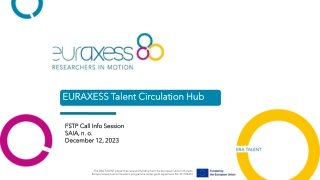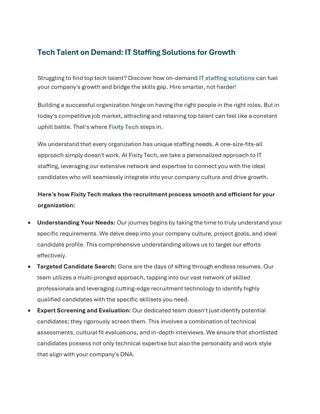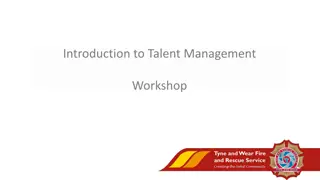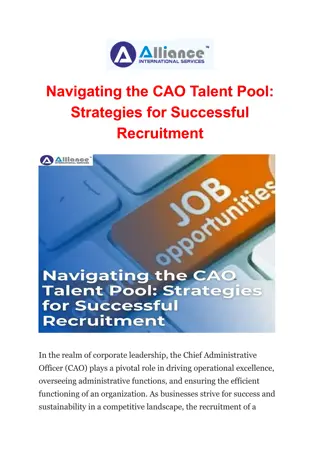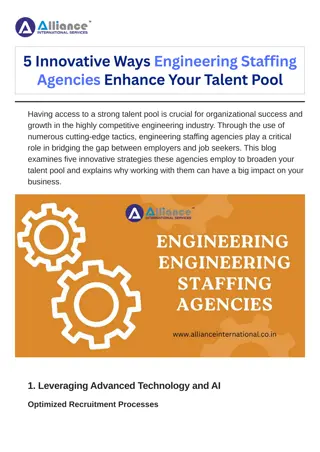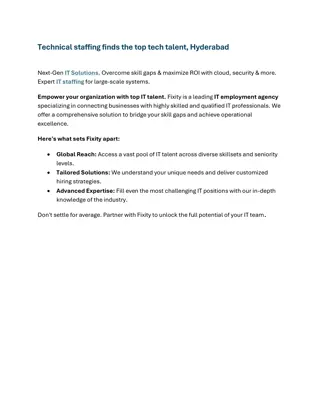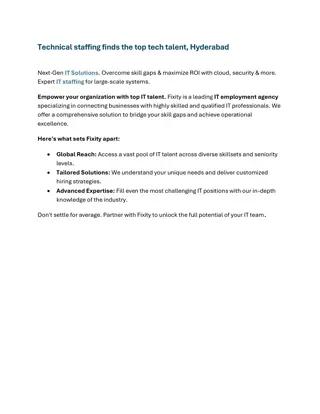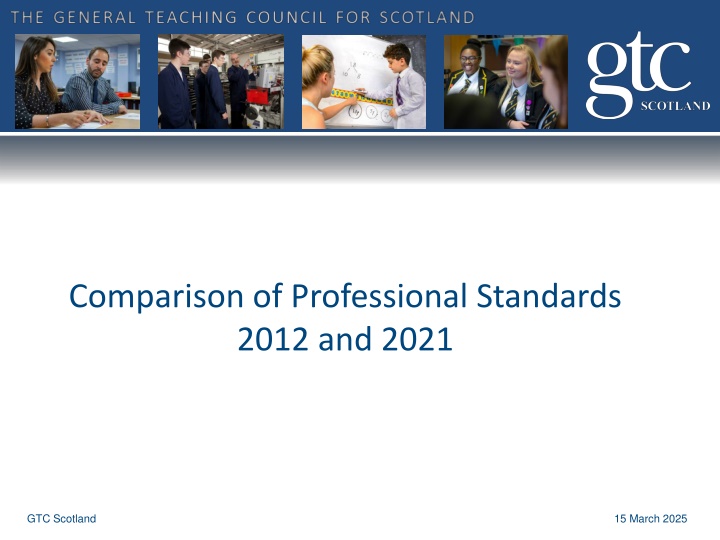
Overview of Talent Review Process for HRBPs
Today's session will cover the Talent Review process for HRBPs at Diageo, focusing on the purpose, outcomes, stages of the process, and global use of talent review outcomes. Diageo's talent principles, talent approach, and benefits sought through talent management will also be discussed.
Download Presentation

Please find below an Image/Link to download the presentation.
The content on the website is provided AS IS for your information and personal use only. It may not be sold, licensed, or shared on other websites without obtaining consent from the author. If you encounter any issues during the download, it is possible that the publisher has removed the file from their server.
You are allowed to download the files provided on this website for personal or commercial use, subject to the condition that they are used lawfully. All files are the property of their respective owners.
The content on the website is provided AS IS for your information and personal use only. It may not be sold, licensed, or shared on other websites without obtaining consent from the author.
E N D
Presentation Transcript
Comparison of Professional Standards 2012 and 2021 GTC Scotland 15 March 2025
Key changes from 2012 to 2021 Overview The Professional Standards 2021 include a section called Being a teacher in Scotland which highlights professional values and roots the Professional Standards as a framework that supports what it means to become, be and grow as a teacher in Scotland. Having a strong focus on professional values helps teachers develop their professional identity and underpins a deep commitment to all learners cognitive, social and emotional growth and wellbeing. They are integral to, and demonstrated through, teachers professional relationships, thinking and actions in their professional practice. Teachers commitment to reflecting on the connections between professional values and actions and career-long professional learning is a critical part of enhancing their professionalism. The Professional Standards 2021 have strengthened aspects of the content relating to, amongst other aspects: Equality and diversity; Additional support needs; Digital literacies; and Learning for Sustainability. GTC Scotland 15 March 2025
Key changes from 2012 to 2021 Restructured The Professional Standards have been restructured in the following ways: Standard for Provisional Registration and Standard for Full Registration have been separated in two documents There is better alignment between Standard for Provisional Registration and Standard for Full Registration and Standard for Career-Long Professional Learning Standard for Middle Leadership and Standard for Headship have been separated in two documents A new section Being a teacher in Scotland outlines teacher professionalism Professional values have been given more emphasis GTC Scotland 15 March 2025
Key changes from 2012 to 2021 Refreshed To ensure the Professional Standards remain contemporary and relevant, the following changes have been made: Teacher professionalism clearly signposted through section 1: Being a teacher in Scotland; The centrality of leadership, professional values and Learning for Sustainability has have been re-stated; All of the Professional Standards have been updated to reflect current educational landscape; Professional values have been expanded to ensure greater emphasis on inclusion, equality and diversity; Changes have been made to the language used to make the Professional Standards more accessible; and Professional illustrations are there to support reflection on practice and professional dialogue. GTC Scotland 15 March 2025
Key changes from 2012 to 2021 To explore the changes in each Professional Standard, click in the boxes below Standard for Provisional Registration Standard for Career Long Professional Learning Standard for Full Registration Standard for Middle Leadership Standard for Headship Standard for Provisional Registration Standard for Career Long Professional Learning Standard for Full Registration Standard for Middle Leadership Standard for Headship GTC Scotland 15 March 2025
Standard for Provisional Registration 2012 2021 1 Professional Values and Personal Commitment 1 Being a Teacher in Scotland 1.1 Professional Values 1.2 Professional Commitment 1.3 Standard for Provisional Registration 2 Professional Knowledge and Understanding 2.1 Curriculum 2.2 Education Systems and Professional Responsibilities 2.3 Pedagogical Theories and Practice 2 Professional Knowledge and Understanding 2.1 Curriculum & Pedagogy 2.2 Professional Responsibilities 3 Professional Skills and Abilities 3.1 Teaching and Learning 3.2 Classroom Organisation and Management 3.3 Pupil Assessment 3.4 Professional Reflection and Communication 3 Professional Skills and Abilities 3.1 Curriculum and Pedagogy 3.2 The Learning Context 3.3 Professional Learning GTC Scotland 15 March 2025
Standard for Provisional Registration 2012 2021 2 Professional Knowledge and Understanding 2 Professional Knowledge and Understanding 2.1 Curriculum Have knowledge and understanding of: the nature of the curriculum and its development the relevant area(s) of pre-school, primary or secondary curriculum planning coherent and progressive teaching programmes to fulfil their responsibilities in literacy, numeracy, health and wellbeing and interdisciplinary learning assessment, recording and reporting 2.1 Curriculum & Pedagogy Have knowledge and understanding of: Pedagogical Theories and Professional Practice Research and Engagement in Practitioner Enquiry Curriculum Design Planning for Assessment, Teaching and Learning 2.3 Pedagogical Theories and Practice Have knowledge and understanding of: relevant educational principles and pedagogical theories to inform professional practices the importance of research and engagement in professional enquiry 2.2 Education Systems and Professional Responsibilities Have knowledge and understanding of: the principal features of the education system, educational policy and practice schools and learning communities in which they teach and their own professional responsibilities within them 2.2 Professional Responsibilities Have knowledge and understanding of: Education Systems Learning Communities GTC Scotland 15 March 2025
Standard for Provisional Registration 2012 2021 3 Professional Skills and Abilities 3 Professional Skills and Abilities 3.1 Teaching and Learning Plan coherent, progressive and stimulating teaching programmes which match learners needs and abilities Communicate effectively and interact productively with learners, individually and collectively Employ a range of teaching strategies and resources to meet the needs and abilities of learners Have high expectations of all learners Work effectively in partnership in order to promote learning and wellbeing 3.1 Curriculum and Pedagogy Plan effectively to meet learners needs Effectively utilise pedagogical approaches and resources Effectively utilise partnerships for learning and wellbeing Effectively employ assessment, recording and reporting as an integral part of the teaching process to support and enhance learning 3.3 Pupil Assessment Use assessment, recording and reporting as an integral part of the teaching process to support and enhance learning 3.2 Classroom Organisation and Management Create a safe, caring and purposeful learning environment Develop positive relationships and positive behaviour strategies 3.2 The Learning Context Effectively organise and manage learning Effectively utilise learner participation Build positive relationships for learning 3.4 Professional Reflection and Communication Read and critically engage with professional literature, educational research and policy Engage in reflective practice to develop and advance career-long 3.3 Professional Learning Engage critically with literature, research and policy Engage in reflective practice to develop and advance career-long professional learning and expertise GTC Scotland professional learning and expertise 15 March 2025
Standard for Full Registration 2012 2021 1 Professional Values and Personal Commitment 1 Being a Teacher in Scotland 1.1 Professional Values 1.2 Professional Commitment 1.3 Standard for Full Registration 2 Professional Knowledge and Understanding 2.1 Curriculum 2.2 Education Systems and Professional Responsibilities 2.3 Pedagogical Theories and Practice 2 Professional Knowledge and Understanding 2.1 Curriculum & Pedagogy 2.2 Professional Responsibilities 3 Professional Skills and Abilities 3.1 Teaching and Learning 3.2 Classroom Organisation and Management 3.3 Pupil Assessment 3.4 Professional Reflection and Communication 3 Professional Skills and Abilities 3.1 Curriculum and Pedagogy 3.2 The Learning Context 3.3 Professional Learning GTC Scotland 15 March 2025
Standard for Full Registration 2012 2021 2 Professional Knowledge and Understanding 2 Professional Knowledge and Understanding 2.1 Curriculum Have knowledge and understanding of: the nature of the curriculum and its development the relevant area(s) of pre-school, primary or secondary curriculum planning coherent and progressive teaching programmes to fulfil their responsibilities in literacy, numeracy, health and wellbeing and interdisciplinary learning assessment, recording and reporting 2.1 Curriculum & Pedagogy Have a depth of knowledge and understanding of: Pedagogical Theories and Professional Practice Research and Engagement in Practitioner Enquiry Curriculum Design Planning for Assessment, Teaching and Learning 2.3 Pedagogical Theories and Practice Have knowledge and understanding of: relevant educational principles and pedagogical theories to inform professional practices the importance of research and engagement in professional enquiry 2.2 Education Systems and Professional Responsibilities Have knowledge and understanding of: the principal features of the education system, educational policy and practice schools and learning communities in which they teach and their own professional responsibilities within them 2.2 Professional Responsibilities Have a depth of knowledge and understanding of: Education Systems Learning Communities GTC Scotland 15 March 2025
Standard for Full Registration 2012 2021 3 Professional Skills and Abilities 3 Professional Skills and Abilities 3.1 Teaching and Learning Plan coherent, progressive and stimulating teaching programmes which match learners needs and abilities Communicate effectively and interact productively with learners, individually and collectively Employ a range of teaching strategies and resources to meet the needs and abilities of learners Have high expectations of all learners Work effectively in partnership in order to promote learning and wellbeing 3.1 Curriculum and Pedagogy Plan effectively to meet learners needs Effectively utilise pedagogical approaches and resources Effectively utilise partnerships for learning and wellbeing Effectively employ assessment, recording and reporting as an integral part of the teaching process to support and enhance learning 3.3 Pupil Assessment Use assessment, recording and reporting as an integral part of the teaching process to support and enhance learning 3.2 Classroom Organisation and Management Create a safe, caring and purposeful learning environment Develop positive relationships and positive behaviour strategies 3.2 The Learning Context Effectively organise and manage learning Effectively utilise learner participation Build positive relationships for learning 3.4 Professional Reflection and Communication Read and critically engage with professional literature, educational research and policy Engage in reflective practice to develop and advance career-long 3.3 Professional Learning Engage critically with literature, research and policy Engage in reflective practice to develop and advance career-long professional learning and expertise GTC Scotland professional learning and expertise 15 March 2025
Standard for Career-Long Professional Learning 2012 2021 1 Professional Values and Personal Commitment 1 Being a Teacher in Scotland 1.1 Professional Values 1.2 Professional Commitment 1.3 Standard for Career Long Professional Learning 2 Professional Knowledge and Understanding, Professional Skills and Abilities 2.1 Professional Knowledge and Understanding 2.2 Professional Skills and Abilities 2 Professional Knowledge and Understanding 2.1 Curriculum & Pedagogy 2.2 Professional Responsibilities 3 The Professional Actions in Career-Long Professional Learning (i) Pedagogy, learning and subject knowledge; (ii) Curriculum and assessment; (iii) Enquiry and research; (iv) Educational contexts and current debates in policy, education and practice; (v) Sustaining and developing professional learning; (vi) Learning for sustainability. 3 Professional Skills and Abilities 3.1 Curriculum and Pedagogy 3.2 The Learning Context 3.3 Professional Learning GTC Scotland 15 March 2025
Standard for Career-Long Professional Learning 2012 2021 2 Professional Knowledge and Understanding, Professional Skills and Abilities 2 Professional Knowledge and Understanding 2.1 Professional Knowledge and Understanding Teachers working with this standard are expected to develop deep, critically informed knowledge and understanding to enhance skills and abilities in relation to the key areas of career-long professional learning: Curriculum and assessment Enquiry and research Educational contexts and current debates in policy, education and practice Sustaining and developing professional learning Learning for sustainability 2.1 Curriculum & Pedagogy Have an enhanced and critically informed knowledge and understanding of: Pedagogical Theories and Professional Practice Research and Engagement in Practitioner Enquiry Curriculum Design Planning for Assessment, Teaching and Learning 2.2 Professional Responsibilities Have an enhanced and critically informed knowledge and understanding of: Education Systems Learning Communities 2.2 Professional Skills and Abilities Teachers working with this standard are expected to develop and apply their knowledge, skills and expertise through enquiry and sustained professional learning to: deepen and develop subject, curricular, and pedagogic knowledge to be able to lead learners and the learning of colleagues; question, develop and account for practice in critically informed ways and provide an informed rationale for professional actions; systematically investigate, analyse and evaluate the impact of practice; critically question and challenge educational assumptions, beliefs and values of self and system; critically engage with a range of educational literature, research and policy to make meaningful links to inform and change practice, where appropriate; work to create, contribute to, and lead a collegiate culture, through collaborative enquiry, peer observation with constructive feedback, professional dialogue and debate; work collaboratively across disciplines, professions and communities, locally and GTC Scotland globally. 15 March 2025
Standard for Career-Long Professional Learning 2012 2021 3 The Professional Actions in Career-Long Professional Learning 3 Professional Skills and Abilities (i) Pedagogy, learning and subject knowledge; (ii) Curriculum and assessment; (vi) Learning for sustainability. 3.1 Curriculum and Pedagogy Plan effectively to meet learners needs Effectively utilise pedagogical approaches and resources Effectively utilise partnerships for learning and wellbeing Effectively employ assessment, recording and reporting as an integral part of the teaching process to support and enhance learning 3.2 The Learning Context Effectively organise and manage learning Effectively utilise learner participation Build positive relationships for learning (iii) Enquiry and research; (iv) Educational contexts and current debates in policy, education and practice; (v) Sustaining and developing professional learning; 3.3 Professional Learning Engage critically with literature, research and policy Engage in reflective practice to develop and advance career-long professional learning and expertise GTC Scotland 15 March 2025
Standard for Middle Leadership 2012 2021 1 Professional Values and Personal Commitment 1 Being a Teacher in Scotland 1.1 Professional Values 1.2 Professional Commitment 1.3 Standard for Middle Leadership 2 Strategic Vision, Professional Knowledge and Understanding and Interpersonal Skills and Abilities 2.1 Strategic Vision 2.2 Professional Knowledge and Understanding 2.3 Interpersonal Skills and Abilities 2 Professional Knowledge and Understanding 2.1 Curriculum, Pedagogy, Leadership and Strategic Vision 2.2 Professional Responsibilities 3 The Professional Actions of Middle Leaders (i) Develop a range of strategies for individual and collective self-evaluation which contribute to school improvement; (ii) Develop coherent approaches to professional learning which build and sustain teachers practice; (iii) Lead and work collaboratively to enhance teaching which leads to high quality learning experiences; (iv) Build and sustain partnerships with colleagues, learners, parents and other stakeholders to meet the identified needs of all learners; (v) Manage allocated resources proactively and effectively to meet learning and development priorities. 3 Professional Skills and Abilities 3.1 Curriculum, Pedagogy, Leadership and Strategic Vision 3.2 The Learning Context 3.3 Professional Learning 3.4 Self-Evaluation 3.5 Resources GTC Scotland 15 March 2025
Standard for Middle Leadership 2012 2021 2 Strategic Vision, Professional Knowledge and Understanding and Interpersonal Skills and Abilities 2 Professional Knowledge and Understanding 2.1 Strategic Vision Leaders exemplify in their personal and professional life, and in the way they lead the learning community, the vision and culture they seek to develop throughout the establishment. Leaders steer the creation and the sharing of the strategic vision, ethos and aims for the establishment, which inspire and motivate learners, staff and all members of the learning community and its partners and sets high expectations for every learner. Central to the development and demonstration of this strategic vision, all leaders commit to and model career-long learning as a 'leading learner'; and thus encourage others to engage in career-long learning to enhance their practice. 2.1 Curriculum, Pedagogy, Leadership and Strategic Vision Understand how to develop and demonstrate a strategic vision Have knowledge and understanding of political, economic, sociological, technological, legal and environmental trends and developments to enhance positive outcomes for all learners Have an enhanced and critically informed understanding of Curriculum Have knowledge and understanding of Leadership and Management related to your context 2.2 Professional Knowledge and Understanding Teaching and Learning Education Policy Social and environmental trends and developments Leadership and management 2.2 Professional Responsibilities Understand and demonstrate Political Insight Understand and demonstrate self-awareness and inspire and motivate others Judge wisely and decide appropriately Communicate Effectively 2.3 Interpersonal Skills and Abilities Demonstrating self-awareness and inspiring and motivating others Judging wisely and deciding appropriately Communicating effectively Demonstrating political insight GTC Scotland 15 March 2025
Standard for Middle Leadership 2012 2021 3 The Professional Actions of Middle Leaders 3 Professional Skills and Abilities 3.1 Curriculum, Pedagogy, Leadership and Strategic Vision Middle leaders, with colleagues and within their specific area/s of responsibility, contribute to designing and building the curriculum (i.e. through the practices that take place in learning communities in developing content, pedagogy, assessment and provision, as educational programmes are planned, enacted and evaluated). They critically engage with policy, research and practice to inform their knowledge and understanding of curriculum. Support the design and provision of a curriculum informed by theoretical principles of curriculum design and purposes of education Enable and sustain a coherent approach to the development and improvement of curriculum practices (including pedagogy and assessment) in line with agreed strategic and operational priorities Enable and sustain processes which actively promote professional dialogue, critical reflection and collegial practice as a way of evaluating and enhancing curriculum practices (including pedagogy and assessment practices) and wellbeing 3.3 Lead and work collaboratively to enhance teaching which leads to high quality learning experiences; support the improvement of teaching and learning and set consistently high expectations for all in the school community work with teams to design coherent and progressive programmes which address learning needs establish and develop pedagogic practices to meet the learning and pastoral needs of all learners use collaborative processes to monitor and review pedagogic practice, working across the team systematically gather and use assessment feedback and learners progress data to evaluate and plan future learning critically engage with literature, research and policy in relation to all of the above GTC Scotland 15 March 2025
Standard for Middle Leadership 2012 2021 3 The Professional Actions of Middle Leaders 3 Professional Skills and Abilities 3.2 The Learning Context Middle leaders, with colleagues and within their specific area/s of responsibility, help promote a culture of wellbeing for all. In line with their identified strategic and operational priorities, they enable and sustain positive and purposeful relationships and partnerships with colleagues, learners, and others across the learning communityto meet the identified needs of all learners. They critically engage with policy, research and practice to inform their knowledge and understanding of the learning environment. Lead and support the vision, values, ethos and aims of the learning community with colleagues, learners, parents/carers and families and wider community Encourage and facilitate learner participation in planning and deciding about their own learning and the wider decision-making within the learning community Lead individual and collegial activities to help establish, enable and sustain trusting relationships with parents/carers and families Help promote and support partnership working with colleagues, parents/carers and families, other professionals and agencies to support the rights and wellbeing of every learner 3.4 Build and sustain partnerships with colleagues, learners, parents and other stakeholders to meet the identified needs of all learners; establish and use processes for the regular review of learners in order to identify learners needs establish and enhance the opportunities for learners to contribute to the planning and enhancement of their own learning programmes build partnerships with parents and carers to support the learner s needs work collaboratively with other professions and agencies to support the learning, pastoral and emotional needs of learners critically engage with literature, research and policy in relation to the above GTC Scotland 15 March 2025
Standard for Middle Leadership 2012 2021 3 The Professional Actions of Middle Leaders 3 Professional Skills and Abilities 3.3 Professional Learning Middle leaders, with colleagues and within their specific area/s of responsibility, model, lead and promote a collaborative culture of professional learning. They critically engage with policy, research and practice to inform their knowledge and understanding of professional learning. Lead and promote a culture of career-long professional learning which builds and sustains individual and team capacity and supports identified and agreed priorities Enable and sustain approaches and processes which support colleagues to engage in critically reflective practice as an integral part of career-long professional learning 3.2 Develop coherent approaches to professional learning which build and sustain teachers practice; work within school policies with regard to staffing and personnel issues establish and use strategies to identify individual and team professional learning needs to support the school s improvement agenda create coherent opportunities for collaborative development activities evaluate the impact of professional learning on teachers practice and understanding, in relation to outcomes for learners critically engage with literature, research and policy in relation to all of the above 3.4 Self-Evaluation Middle leaders, with colleagues and within their specific area/s of responsibility, contribute to and sustain a culture of self-evaluation for school and learning community improvement to evaluate the impact on every learner. They critically engage with policy, research and practice to inform their knowledge and understanding of self-evaluation. Develop and sustain a range of inclusive and supportive relationships, processes and practices which promote a culture of self-evaluation in line with agreed strategic and operational priorities Develop and sustain the effective use of a wide range of robust and credible information to support and inform decisions and improvements across the school and learning community in line with agreed strategic and operational priorities Collaborate with colleagues, learners, parents/carers and families and the wider learning community in identifying, agreeing and implementing improvement priorities Utilise and support systems for ongoing monitoring and review of the school and learning community improvement agenda 3.1 Develop a range of strategies for individual and collective self- evaluation which contribute to school improvement; Middle leaders foster an ethos to support self-evaluation and plan specific opportunities for this to take place Middle leaders enable staff individually and collectively to engage in regular and rigorous self-evaluation Middle leaders use established systems to monitor progress of the team s improvement agenda Middle leaders critically engage with literature, research and policy, in relation to all of the above GTC Scotland 15 March 2025
Standard for Middle Leadership 2012 2021 3 The Professional Actions of Middle Leaders 3 Professional Skills and Abilities 3.5 Resources Middle leaders, with colleagues and within their specific area/s of responsibility, manage allocated resources in a fair, transparent and equitable manner in line with identified strategic and operational priorities. They critically engage with policy, research and practice to inform their knowledge and understanding of equitable and sustainable use of resources. Make best operational use of all available resources in line with identified strategic and operational priorities, ensuring and maintaining a clear focus on the interests of learners Work within the structure of employment legislation, national and local agreements and policies governing employment in line with identified strategic and operational priorities 3.5 Manage allocated resources proactively and effectively to meet learning and development priorities. Middle leaders: identify priorities within their area and allocate resources to achieve these set expectations and ensure resources are allocated and used in fair and effective ways establish and use systems to monitor the use of resources within their areas of responsibility critically engage with literature, research and policy texts GTC Scotland 15 March 2025
Standard for Headship 2012 2021 1 Professional Values and Personal Commitment 1 Being a Teacher in Scotland 1.1 Professional Values 1.2 Professional Commitment 1.3 Standard for Headship 2 Professional Knowledge and Understanding 2.1 Curriculum 2.2 Education Systems and Professional Responsibilities 2.3 Pedagogical Theories and Practice 2 Professional Knowledge and Understanding 2.1 Curriculum, Pedagogy, Leadership and Strategic Vision 2.2 Professional Responsibilities 4 Professional Skills and Abilities (i) Establish, sustain and enhance the culture of self-evaluation for school improvement; (ii) Develop staff capability, capacity and leadership to support the culture and practice of learning; (iii) Ensure consistent high quality teaching and learning for all learners; (iv) Build and sustain partnerships with learners, families and relevant partners to meet the identified needs of all learners; (v) Allocate resources effectively in line with identified strategic and operational priorities. Across all of these areas, Head Teachers contribute to leadership for improvement at school and system level. 3 Professional Skills and Abilities 3.1 Curriculum, Pedagogy, Leadership and Strategic Vision 3.2 The Learning Context 3.3 Professional Learning 3.4 Self-Evaluation 3.5 Resources GTC Scotland 15 March 2025
Standard for Headship 2012 2021 2 Strategic Vision, Professional Knowledge and Understanding and Interpersonal Skills and Abilities 2 Professional Knowledge and Understanding 2.1 Strategic Vision Leaders exemplify in their personal and professional life, and in the way they lead the learning community, the vision and culture they seek to develop throughout the establishment. Leaders steer the creation and the sharing of the strategic vision, ethos and aims for the establishment, which inspire and motivate learners, staff and all members of the learning community and its partners and sets high expectations for every learner. Central to the development and demonstration of this strategic vision, all leaders commit to and model career-long learning as a 'leading learner'; and thus encourage others to engage in career-long learning to enhance their practice. 2.1 Curriculum, Pedagogy, Leadership and Strategic Vision Fully understand how to develop and demonstrate a strategic vision Have knowledge and understanding of political, economic, sociological, technological, legal and environmental trends and developments Have an enhanced and critically informed understanding of Curriculum Have knowledge and understanding of Leadership and Management 2.2 Professional Knowledge and Understanding Teaching and Learning Education Policy Social and environmental trends and developments Leadership and management 2.2 Professional Responsibilities Fully understand and demonstrate Political Insight Fully understand and demonstrate self-awareness and inspire and motivate others Judge wisely and decide appropriately Communicate Effectively 2.3 Interpersonal Skills and Abilities Demonstrating self-awareness and inspiring and motivating others Judging wisely and deciding appropriately Communicating effectively Demonstrating political insight GTC Scotland 15 March 2025
Standard for Headship 2012 2021 4 The Professional Actions of Head Teachers 3 Professional Skills and Abilities 4.3 Ensure consistent high quality teaching and learning for all learners. Head Teachers: build a shared vision to support the improvement of teaching and learning and set consistently high expectations for all in the school community ensure appropriate curriculum design and planning are developed to meet the learning and pastoral needs of all learners establish and sustain processes to develop pedagogic practices across the school build collaborative processes to review and enhance pedagogic practice critically engage with literature, research and policy in relation to all of the above 3.1 Curriculum, Pedagogy, Leadership and Strategic Vision Headteachers lead and work collaboratively with the learning community to design and build the curriculum (i.e. through the practices that take place in learning communities in developing content, pedagogy, assessment and provision, as educational programmes are planned, enacted and evaluated). They critically engage with policy, research and practice to inform strategic knowledge and understanding of curriculum. Work with the learning community to design and build a shared vision to provide a curriculum informed by theoretical principles of curriculum design and purposes of education Work with the learning community to establish, enable and sustain a strategic approach to the development and improvement of curriculum practices (including pedagogy and assessment) informed by knowledge and understanding of underpinning principles and purposes Work with the learning community to establish, enable and sustain processes which actively promote professional dialogue, critical reflection and collegial practice as a way of evaluating and enhancing curriculum practices (including pedagogy and assessment practices) and wellbeing among the school community GTC Scotland 15 March 2025
Standard for Headship 2012 2021 4 The Professional Actions of Head Teachers 3 Professional Skills and Abilities 4.4 Build and sustain partnerships with learners, families and relevant partners to meet the identified needs of all learners. Head Teachers: build and communicate the vision, values, ethos and aims of the school with partners embed processes to ensure learners contribute to planning and enhancement of their own learning programmes develop strategies to foster parental involvement build, maintain and review partnerships with other professions and agencies to support the learning, pastoral and emotional needs of learners critically engage with literature, research and policy in relation to the above 3.2 The Learning Context Headteachers lead and work collaboratively to establish a culture which promotes wellbeing for self, others and the natural world to enable and sustain positive and purposeful relationships and partnerships with colleagues, learners, and others across the learning community to meet the identified needs of all learners. They critically engage with policy, research and practice to inform strategic knowledge and understanding of the learning environment. Agree, share and enact the vision, values, ethos and aims of the learning community with colleagues, learners, parents/carers and families and wider community Agree a strategic approach to encourage and facilitate learner participation in planning and deciding about their own learning and wider decision- making within the learning community Actively establish, enable and sustain trusting relationships with parents/carers and families Establish and sustain a range of approaches which promote and support partnership working with colleagues, parents/carers and families, other professionals and agencies to support the rights and wellbeing of every learner and the wider work and life of the school GTC Scotland 15 March 2025
Standard for Headship 2012 2021 4 The Professional Actions of Head Teachers 3 Professional Skills and Abilities 4.2 Develop staff capability, capacity and leadership to support the culture and practice of learning; Head Teachers work within the structure of employment legislation, national and local agreements and policies governing employment Head Teachers establish and promote collaborative practice to support a culture of learning within and beyond the school Head Teachers establish and ensure the consistent use of PRD processes to identify strengths and development needs Head Teachers ensure a systematic approach to support the culture of professional learning Head Teachers build systems to monitor the impact of professional learning on the culture of learning. Head Teachers contribute to systems level leadership of education in their context and beyond Head Teachers critically engage with literature, research and policy in relation to all of the above 3.3 Professional Learning Headteachers establish and promote a collaborative culture of professional learning within and beyond the school and wider learning community. They critically engage with policy, research and practice to inform strategic knowledge and understanding of professional learning. Co-create and lead a culture which promotes and sustains career-long professional learning across the school and learning community Ensure, enable and sustain approaches and processes which support engagement with critically reflective practice as an integral part of career- long professional learning and the professional learning culture of the school and learning community GTC Scotland 15 March 2025
Standard for Headship 2012 2021 4 The Professional Actions of Head Teachers 3 Professional Skills and Abilities 4.1 Establish, sustain and enhance the culture of self-evaluation for school improvement. Head teachers: establish a range of relationships and practices to foster self-evaluation at every level in the school establish and use systems to collect evidence with which to inform decision making establish and use processes to gather valid information from stakeholders to inform improvement strategies collaborate with staff, learners, parents and the wider school community and networks in identifying, agreeing and implementing improvement priorities develop systems for ongoing monitoring and review of the school s improvement agenda critically engage with literature, research and policy, in relation to all of the above 3.4 Self-Evaluation Headteachers ensure collegial practices are established to enable and sustain a culture of self-evaluation for whole school and learning community improvement to evaluate the impact on every learner. They critically engage with policy, research and practice to inform strategic knowledge and understanding of self-evaluation. Establish, enable, and sustain a range of inclusive, resilient, and adaptive relationships, processes and practices which engender an ethos and culture of self-evaluation at every level in the school and learning community Develop and sustain the effective use of a wide range of robust and credible information to support and inform decisions and improvements across the school and learning community in line with agreed strategic and operational priorities Lead and collaborate with colleagues, learners, parents/carers and families and the wider learning community in identifying, agreeing and implementing improvement priorities Develop systems for ongoing monitoring and review of the strategic improvement cycle with the school and learning community GTC Scotland 15 March 2025
Standard for Headship 2012 2021 4 The Professional Actions of Head Teachers 3 Professional Skills and Abilities 4.5 Allocate resources effectively in line with identified strategic and operational priorities. Head Teachers use the review and improvement planning processes to identify priorities and inform resourcing decisions Head Teachers allocate resources in a fair and equitable manner in line with priorities to support learning Head Teachers ensure systems are established and used to monitor, evaluate and review the use of resources Head Teachers critically engage with literature, research and policy texts 3.5 Resources Headteachers work with colleagues and the wider learning community to strategically manage and allocate resources in a fair, transparent and equitable manner in line with identified strategic and operational priorities. They critically engage with policy, research and practice to inform strategic knowledge and understanding of equitable and sustainable use of resources. Ensure best strategic and operational use of available resources ensuring and maintaining a clear focus on the interests of learners Work within the structure of employment legislation, national and local agreements and policies governing employment GTC Scotland 15 March 2025

